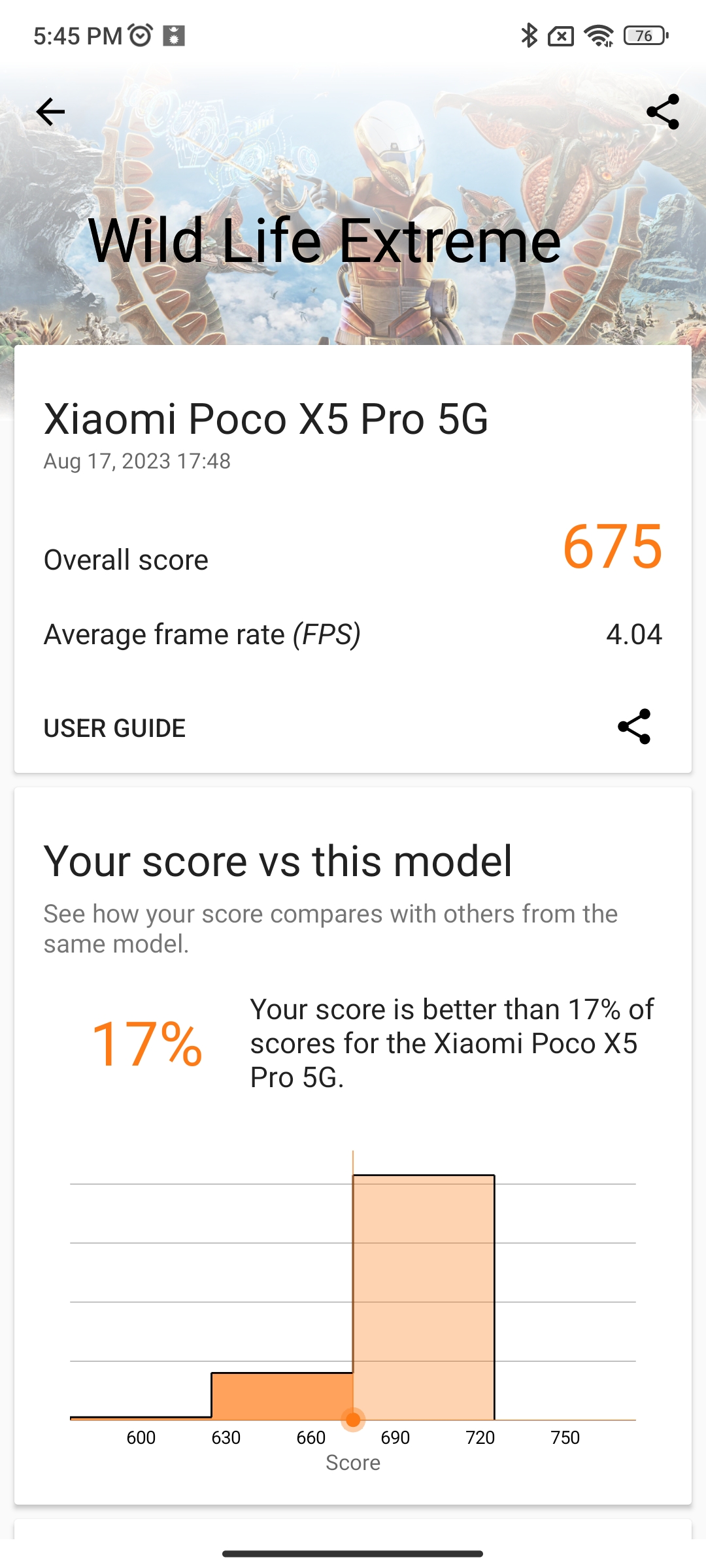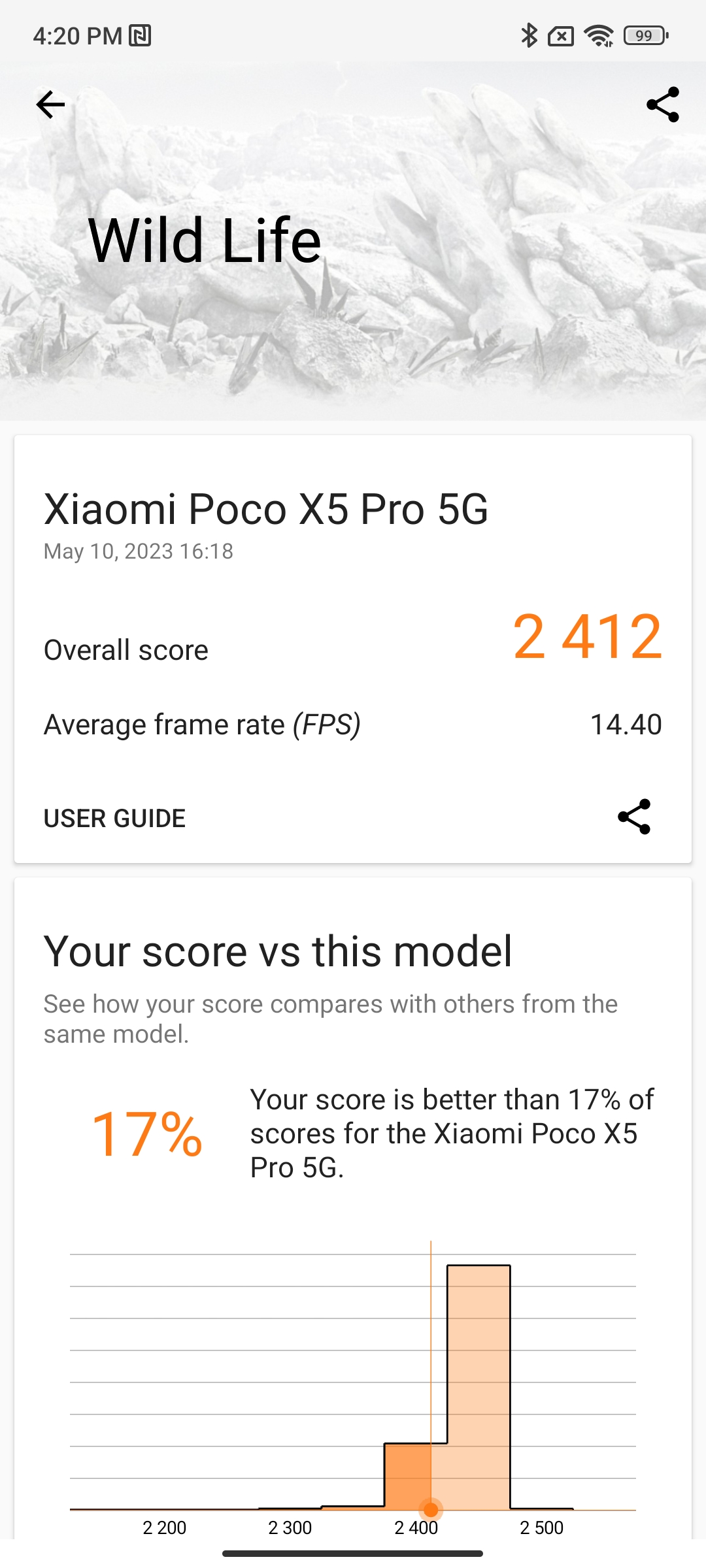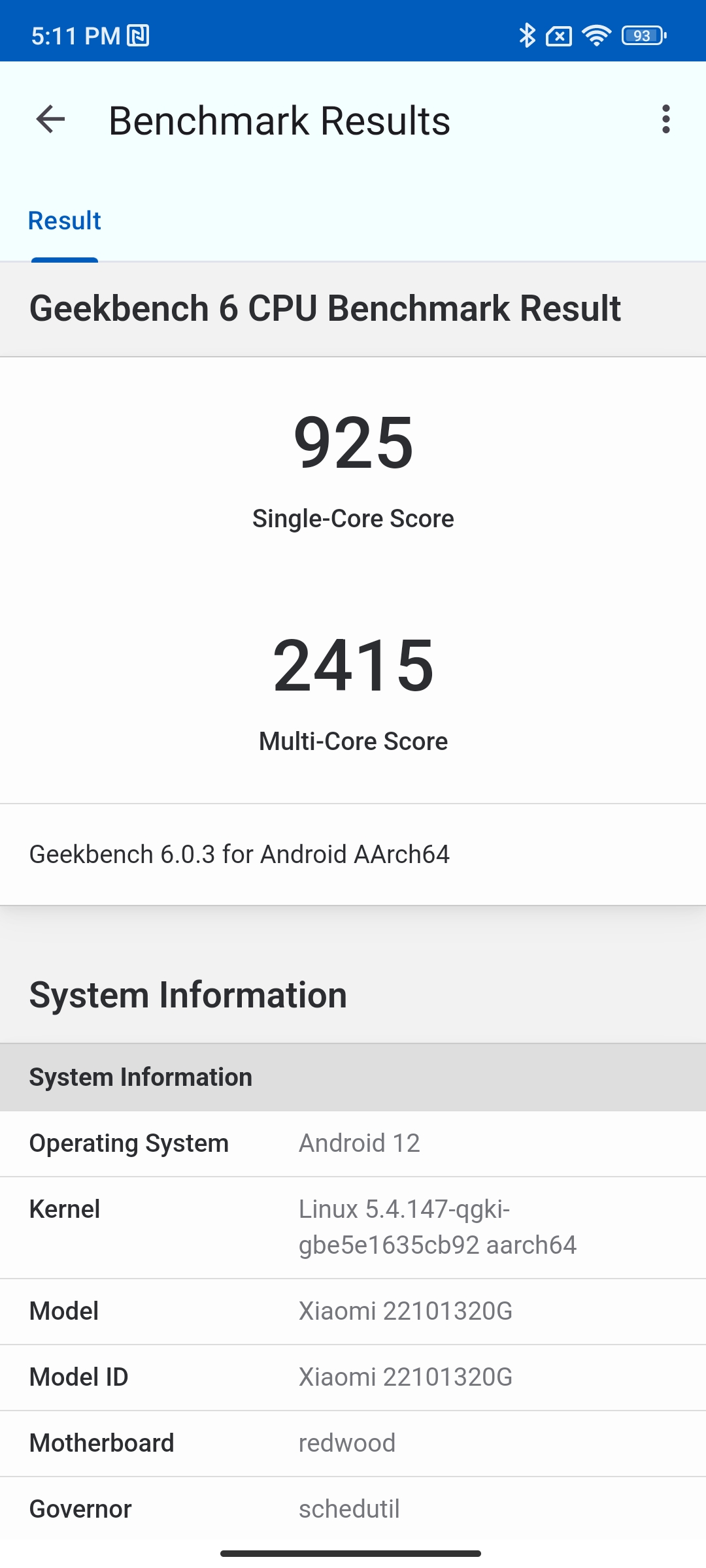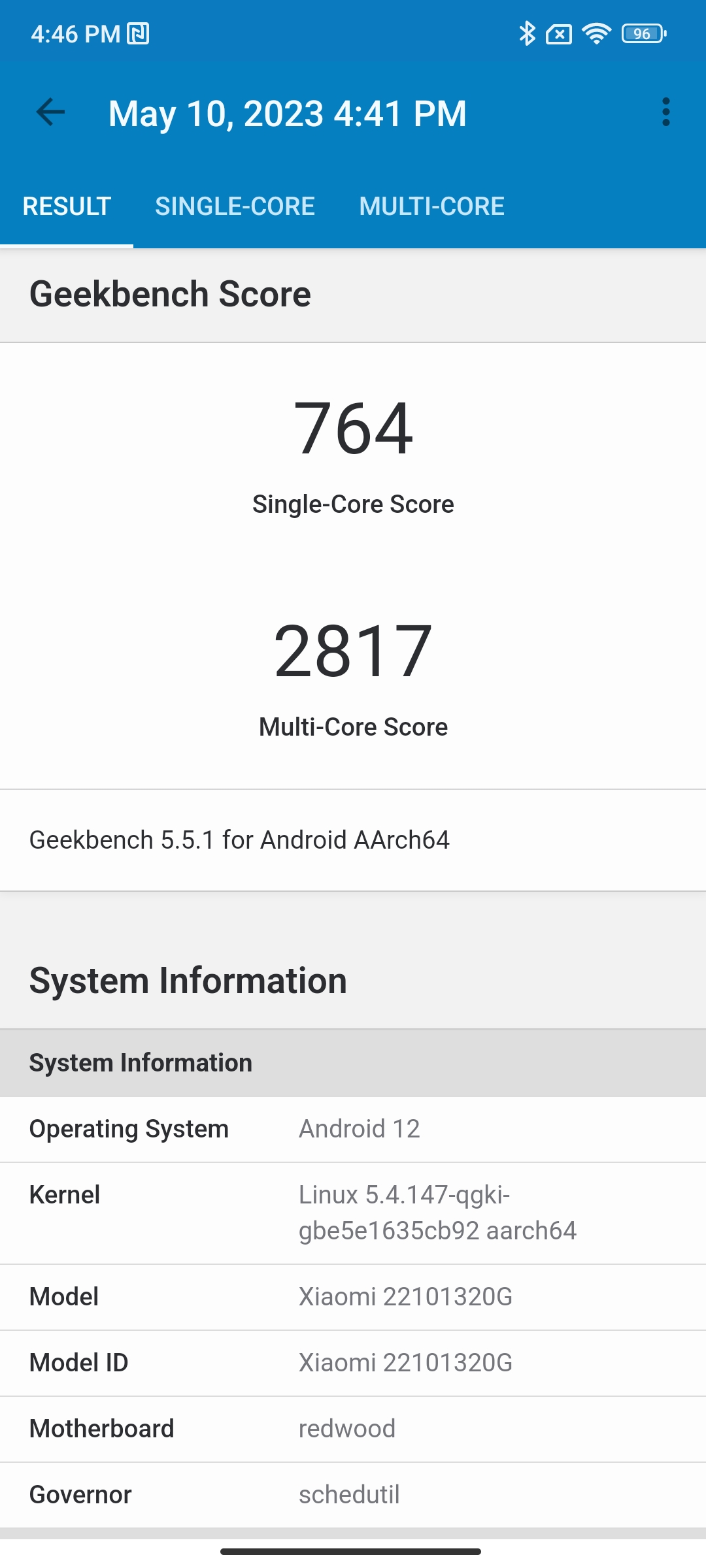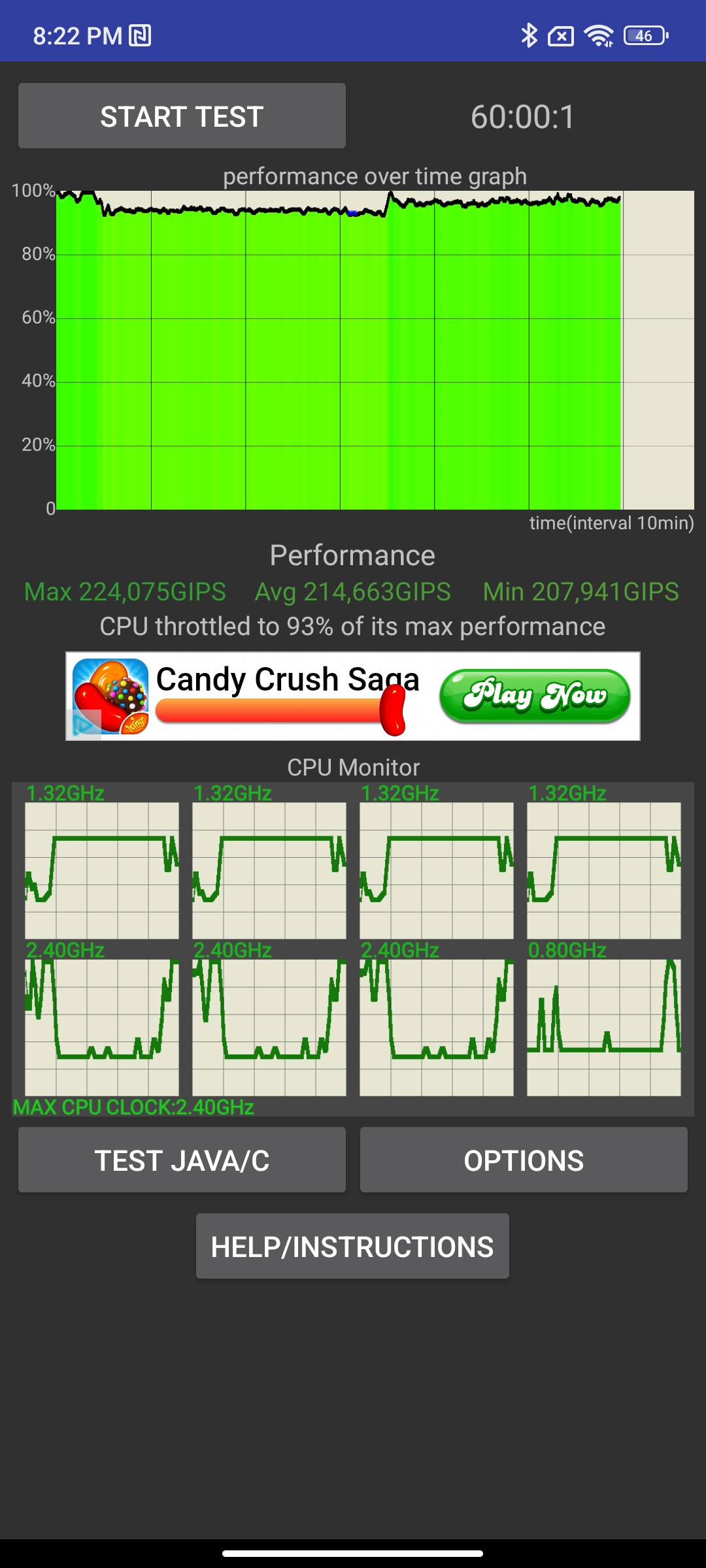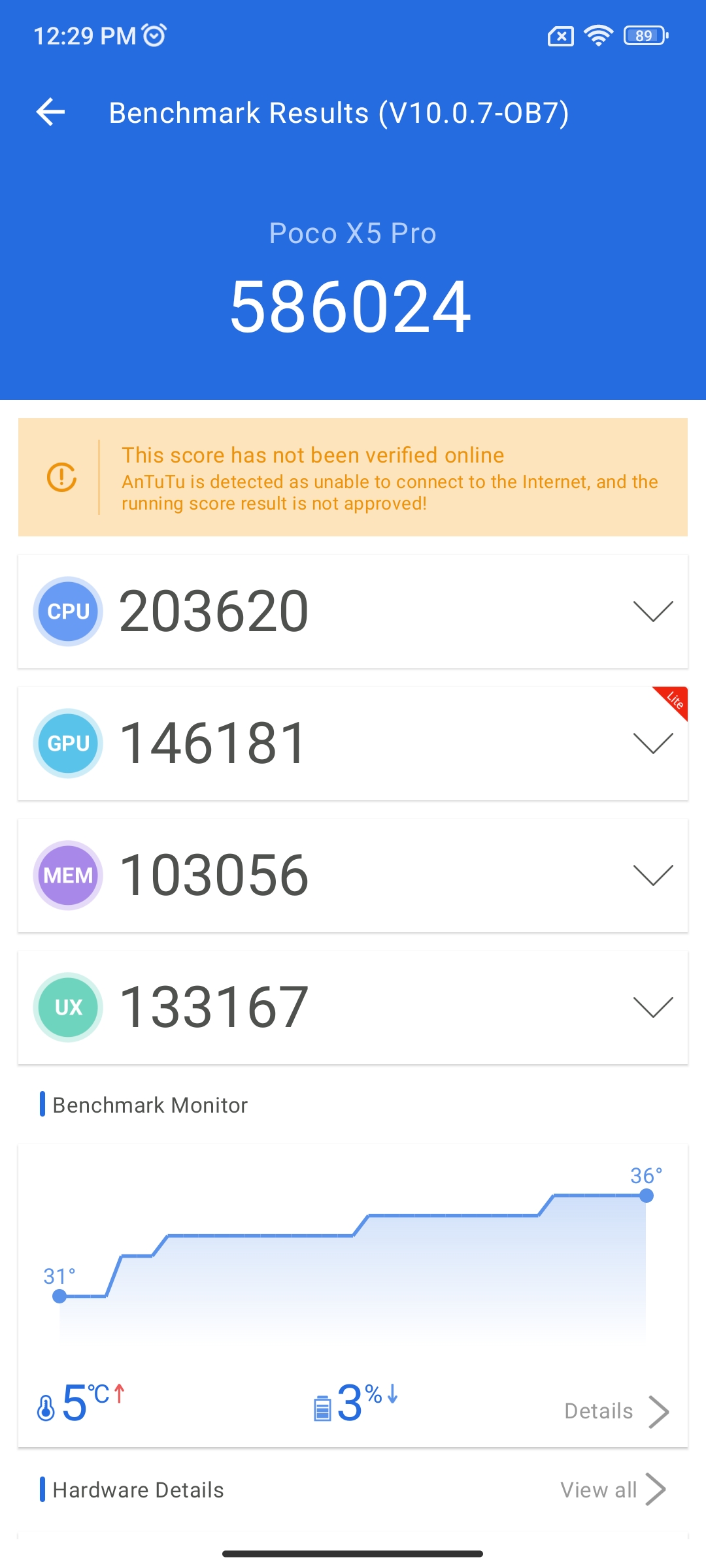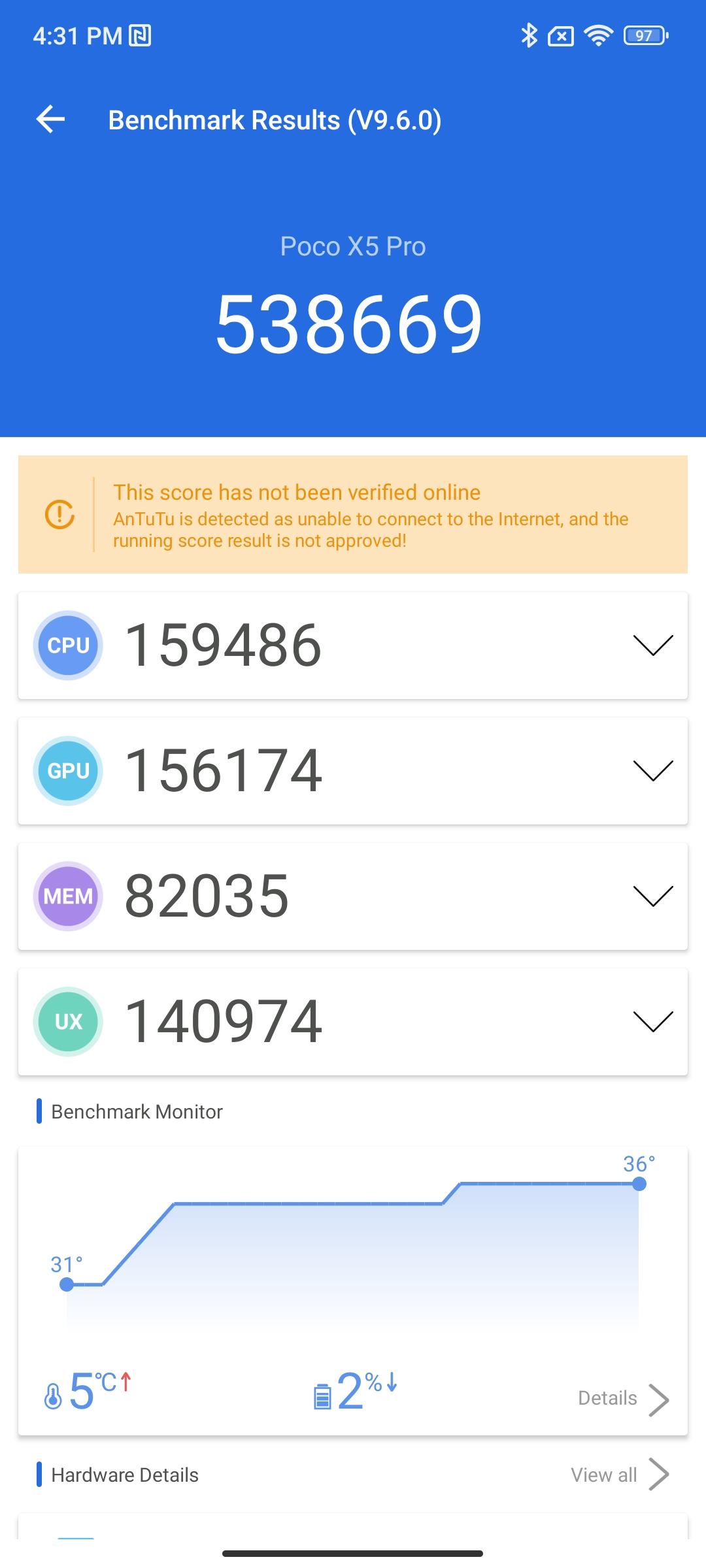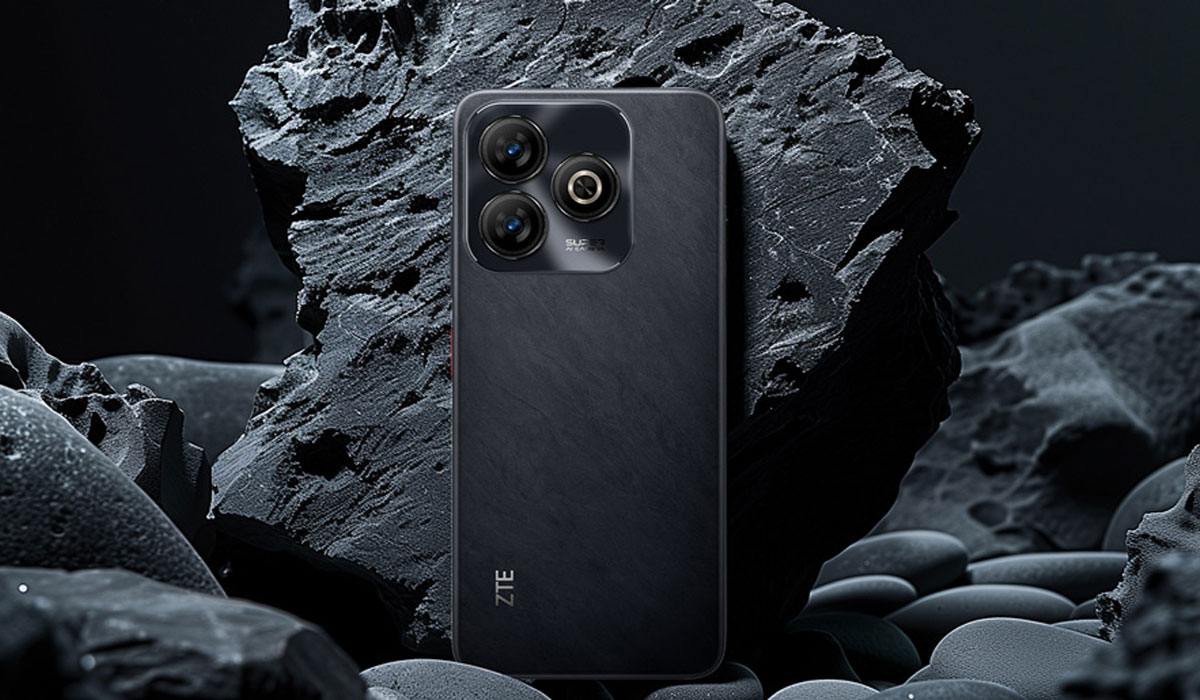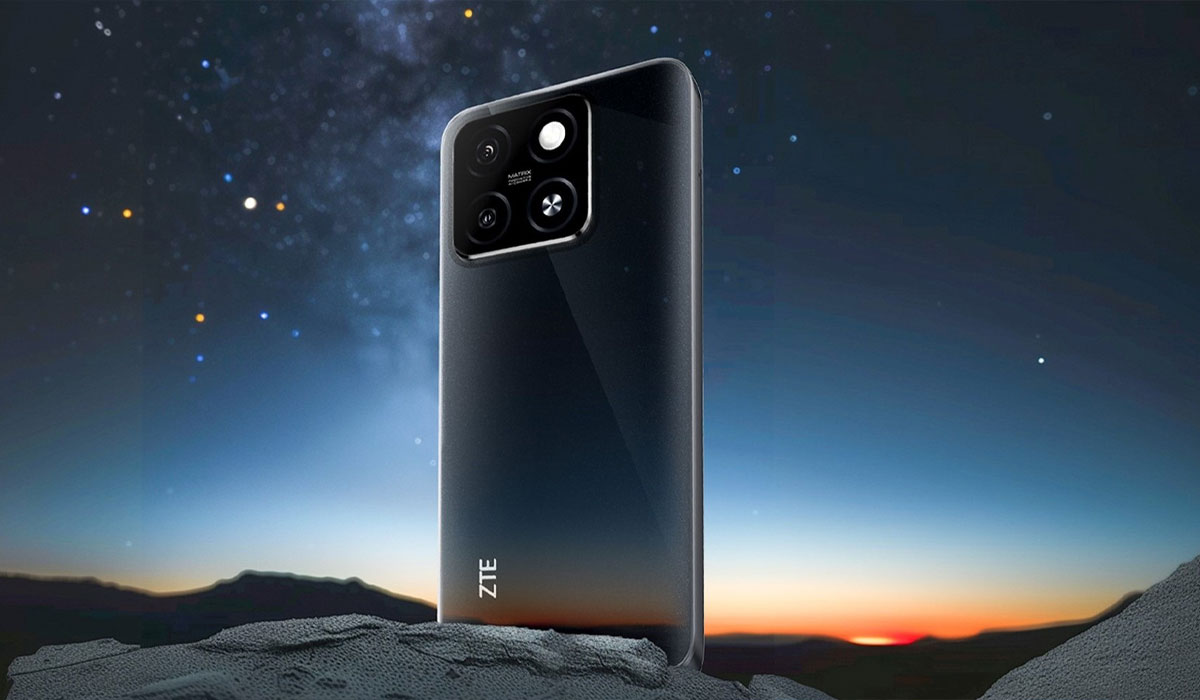TechLekh Verdict
The Poco X5 Pro is a fantastic mid-range smartphone, offering an excellent gaming experience at its price point along with a smooth and vibrant display. Surprisingly, its main camera performs well even in low-light conditions, which is uncommon for Poco devices in the past.
The ultrawide camera provides satisfactory results, and the battery life is dependable, with fast charging support.
One notable concern is the software. It boots on Android 12, which is unacceptable in 2023. This raises questions about its future-proofing, although it has already received the Android 13 upgrade.
In summary, the Poco X5 Pro offers great value. However, if you prioritize camera quality for still photos and speaker performance more than the gaming performance, the Redmi Note 12 Pro 5G could be a compelling alternative.
Pros
- Great performance
- Solid display
- Above average speaker
- Good main camera
- Precise haptic feedback
- Dependable battery life
- Fast charging support
- Good design
Cons
- No software support promise
- MIUI bugs here and there
In 2021, the Poco X3 Pro gained immense popularity among mid-range gamers. Regrettably, its successor, the Poco X4 Pro, never made its way to Nepal.
Fast forward to 2023, and we now have the Poco X5 Pro. It offers two variants for Nepali consumers: the base model with 6GB of RAM and 128GB of storage, priced at Rs. 39,999, and a higher-end version with 8GB of RAM and 256GB of storage, which costs Rs. 43,000.
So, the question arises: Is the Poco X5 Pro worth the purchase? How does it perform, and what about its camera capabilities? In this review, I will delve into its performance, and camera quality, and outline its pros and cons. Stay tuned for the full Poco X5 Pro review.
Poco X5 Pro Specifications
- Body: 162.91 x 76.03 x 7.90 mm, 181 g, IP53 dust and splash resistant
- SIM: Dual SIM (Nano-SIM, dual stand-by)
- Display: 6.67 inches AMOLED, FHD+, 1080 x 2400, 120Hz, 20:9, 500 nits (typ), 900 nits (HBM), 10bit, Dolby Vision, HDR10+, Gorilla Glass 5
- Chipset: Qualcomm Snapdragon 778G 5G (6 nm)
- CPU: Octa-core (1×2.4 GHz Cortex-A78 & 3×2.2 GHz Cortex-A78 & 4×1.9 GHz Cortex-A55)
- GPU: Adreno 642L
- Memory: 128GB 6GB RAM, 256GB 8GB RAM, no microSD card support
- OS: Android 12, MIUI 14 for POCO
- Rear Camera: 108 MP, f/1.9 (main)
- 8 MP, f/2.2, 120˚ (ultrawide)
- 2 MP, f/2.4, (macro)
- Video: 4K@30fps, 1080p@30/60fps
- Front Camera: 16 MP, f/2.4
- Video: 1080p@30/60fps
- Battery: Non-removable Li-Ion 5000mAh battery, 67W fast charging
- USB: USB-C 2.0, USB On-The-Go
- Misc: Fingerprint (side-mounted), accelerometer, proximity, gyro, compass, 3.5mm headphone jack
- Colors: Yellow, Blue, Black
Poco X5 Pro 5G Price in Nepal: Rs. 39,999 (6/128GB) | Rs. 42,999 (8/256GB)
READ NEXT: Redmi Note 12 Pro 5G Review: An Outstanding Mid-ranger
Poco X5 Pro Review
Design
- 162.91 x 76.03 x 7.90 mm
- 181 g
- Dual SIM (Nano-SIM, dual stand-by)
- IP53 splash and dust resistant

The design of the Poco devices is always interesting, and the Poco X5 Pro is no exception. I have it in a vibrant yellow color, showcasing Poco’s signature design with a distinctive black partition extending across the entire camera width. The design is purely visual though and cannot be felt physically.
While the build material is plastic, it’s not necessarily subpar. Admittedly, it lacks a premium feel, but the design remains respectable. I like the frozen glass finish on its back.
I’m also a fan of the color-matched yellow power button, which adds a unique touch. This button doubles as a fingerprint sensor, delivering both speed and reliability.
For ports, the phone has a USB-C port on the bottom side, along with a mic, SIM card tray, and a speaker. It supports two SIM cards but unfortunately does not have room for a microSD card.
The phone has a stereo speaker setup that supports Dolby Atmos, with one speaker located at the bottom and the other at the top. However, the speaker on the top falls short in comparison. Unlike flagship devices, the two speakers on the Poco X5 Pro are not well balanced, with the top speaker being softer and of inferior quality.
Nevertheless, thanks to the capable downward-firing speaker, the overall audio quality remains commendable. It’s loud, and the bass and depth are satisfactory. However, it’s true that the Redmi Note 12 Pro offers superior speaker quality.
READ NEXT: Samsung Galaxy A34 5G Price in Nepal (April 2025 Updated)
AMOLED Display
- 6.7-inch AMOLED, 120Hz
- FHD+ display (1080 x 2400)
- 500 nits (typ), 900 nits (HBM)
- Dolby Vision, HDR10+

The display on the Poco X5 Pro is impressive. It features a 6.67-inch AMOLED Full HD+ screen.
This display offers vibrant and saturated colors, and the 120Hz refresh rate ensures a remarkably smooth experience while scrolling and navigating.
Moreover, the phone supports Dolby Vision and HDR10+, allowing you to enjoy HDR videos on platforms like YouTube.
Poco claims a maximum brightness of 500 nits and a peak brightness of 900 nits. The display’s brightness is sufficient; even on a sunny day, I found it comfortable to use the phone outdoors.
Great Performance
- Qualcomm Snapdragon 778G 5G (6 nm)
- Octa-core (1×2.4 GHz Cortex-A78 & 3×2.2 GHz Cortex-A78 & 4×1.9 GHz Cortex-A55)
- Adreno 642L
- 6GB RAM 128GB storage
The Poco X5 Pro delivers excellent performance. It is powered by the Snapdragon 778G chipset, offering configurations with up to 8GB of RAM and 256GB of storage. The variant I have comes with 6GB of RAM and 128GB of storage.
While it may not match the sheer power of the Poco X3 Pro‘s Snapdragon 860, it handles everyday tasks without a hitch, and benchmark scores are also impressive. In fact, it performs slightly better than the Dimensity 7050 chipset (essentially a rebranded version of the Dimensity 1080 chipset) found in the Realme 11 Pro series.
Given its gaming-oriented nature, I put it to the test with some games. On PUBG Mobile, when graphics are set to ‘Smooth’, the frame rate can reach ‘Extreme.’ However, pushing the graphics higher restricts you to the ‘Ultra’ frame rate.
While running at the Extreme frame rate, I consistently achieved a stable gameplay experience with an average of 60 fps. Impressively, even after three consecutive sessions, the phone maintained this 60 fps performance.
In the case of Genshin Impact, the default graphics settings are set to low with a frame rate cap of 30 fps. I set the fps to 45, but still, the game maxed out at 30 fps. Higher fps would have made the gameplay smoother, but it was enjoyable nonetheless.
Good Main Camera
- Rear Camera: 108 MP, f/1.9 (main)
- 8 MP, f/2.2, 120˚ (ultrawide)
- 2 MP, f/2.4, (macro)
- Video: 4K@30fps, 1080p@30/60fps

Along with the 108MP ISOCELL HM2 main camera sensor, the Poco X5 Pro has an 8MP ultrawide camera and a 2MP macro camera.
Regarding the macro camera, it’s not really worth considering. Its performance is subpar, and you’d be better off using the 2x zoom feature on the main camera for close-up shots. The macro photos it produces are quite underwhelming, and it’s safe to say that very few, if any, find it useful.
Before delving into photo quality, I’d like to mention a minor issue I encountered with the Poco X5 Pro’s camera app. When switching from the main camera to the ultrawide camera, I observed that the 0.6x button did not function as expected. Instead of switching the lens, tapping on it focuses on the background. This issue is prevalent at all zoom levels.
It’s not a major issue, but it can be a bit inconvenient when you’re trying to quickly capture a photo and switch to a different field of view.
Normal Photos
The main camera surprisingly captures good photos with pleasing colors and a wide dynamic range. There is also sufficient detail in the photos, although it may appear lacking when you zoom in.
Overall, the photos are indeed pleasing. The shutter speed is generally adequate; however, it might feel a bit slow when capturing fast-moving shots at times.
When it comes to low light conditions, the phone here too takes surprisingly good photos. If it is very dark, the night mode can take better photos. The photos have rich detail and good colors.
Portrait Mode
The portrait mode is decent. It does a fair job of separating the subject and blurring the background. The detail is also sufficient. Under good lighting conditions and an appropriate distance, portrait photos can come out impressive.
However, the default blur is overly pronounced and lacks a natural look. But you do have the option to adjust the blur strength to your preference.
Ultrawide Photos
The ultrawide photos appear slightly warmer compared to those taken with the primary camera. While the level of detail is less than that of the main camera, it’s still decent for an ultrawide lens overall.
Front Camera
I like the selfies the phone takes with its 16MP front camera. It exposes the face properly and the skin tone appears pleasing.
Even in complex backgrounds, the HDR does a good job of exposing the face properly. The beauty mode that is turned on by default makes the face smooth and clean.
Video
The Poco X5 Pro is capable of recording video at up to 4K resolution and 30 frames per second (fps). I would describe the video quality as decent. While it may not match the level of detail seen in high-end phones, it is still quite respectable.
Unfortunately, you do not get an OIS (optical image stabilization) on the Poco X5 Pro, a feature found on the Redmi Note 12 Pro. However, the EIS (electronic image stabilization) works well, resulting in stable videos.
Great Battery Life
- 5000mAh battery
- 67W fast charging support

The Poco X5 Pro has a 5000mAh battery, which provides a good battery life. Even with a couple of hours of gaming, the phone comfortably lasts a whole day.
When you need to charge, the phone supports 67W fast charging that charges from 0% to 100% in just around an hour.
Vibration Motor
The vibration motor on the Poco X5 Pro is great. It provides precise haptic feedback and it is fun when it triggers. It adds a tactile experience when interacting with the device.
MIUI 14
- Android 12
- MIUI 14

In terms of software, it comes with Android 12 out of the box, which is unacceptable for a midrange device in 2023. Although it has already received an Android 13 upgrade, this means that one of the few (likely only two or three) major upgrades the Poco X5 Pro was supposed to receive has already been used up. This raises significant concerns about the device’s future-proofing.
The Android OS comes with the MIUI 14 skin, which includes a handful of pre-installed apps. There are two messaging apps and two browser apps — one from Google and one from Xiaomi — that cannot be uninstalled. Additionally, there are 5–6 third-party apps pre-installed; fortunately, these can be uninstalled.
You will find the regular customization options that you expect from MIUI, allowing you to customize the always-on display, notification effect, and themes.
Additionally, you can set different actions for double back taps and triple back taps. However, the phone often registers false double-tap triggers, so I left it turned off. On the bright side, the double-tap fingerprint sensor works as intended.
Interestingly, you can also go to settings and measure your heart rate using the flashlight at the back. While I can’t vouch for its accuracy, it might provide a rough idea or serve as a cool party trick.
The MIUI 14 feature that allows you to copy text from an image is also available on the Poco X5 Pro. However, not all the MIUI 14 features are present on this device, likely because it’s using the “MIUI version for Poco.” One of the missing features is the large folder on the home screen.
Now, a common issue with MIUI is the occasional presence of minor bugs. On a few occasions, UI elements failed to respond or overlapped on the lock screen. While these were minor inconveniences, there was one instance when the phone became completely unresponsive. The display remained turned off, with only the icons on the status bar visible. No matter how many times or how long I pressed the power button, the phone refused to respond. After leaving it in this state for 10–15 minutes, the phone automatically restarted, resolving the problem. However, that experience was far from pleasant.
So this is my Poco X5 Pro review. What do you think of the Poco X5 Pro 5G? Let me know in the comments!
-
Honor X9c Launched In Nepal — And Durability Ain’t All It’s About! *Phew*HIGHLIGHTS The Honor X9c Smart price in Nepal is Rs. 38,999 (12/256GB). It has the…
-
ZTE Blade A75 Launched in Nepal: Large Storage on a BudgetHIGHLIGHTS The ZTE Blade A75 4G price in Nepal is Rs. 13,999 (4/256GB). The phone…
-
ZTE Blade A55 with 90Hz Refresh Rate Launched in NepalHIGHLIGHTS The ZTE Blade A55 price in Nepal is Rs. 11,999 (4/64GB) and Rs. 12,999…













